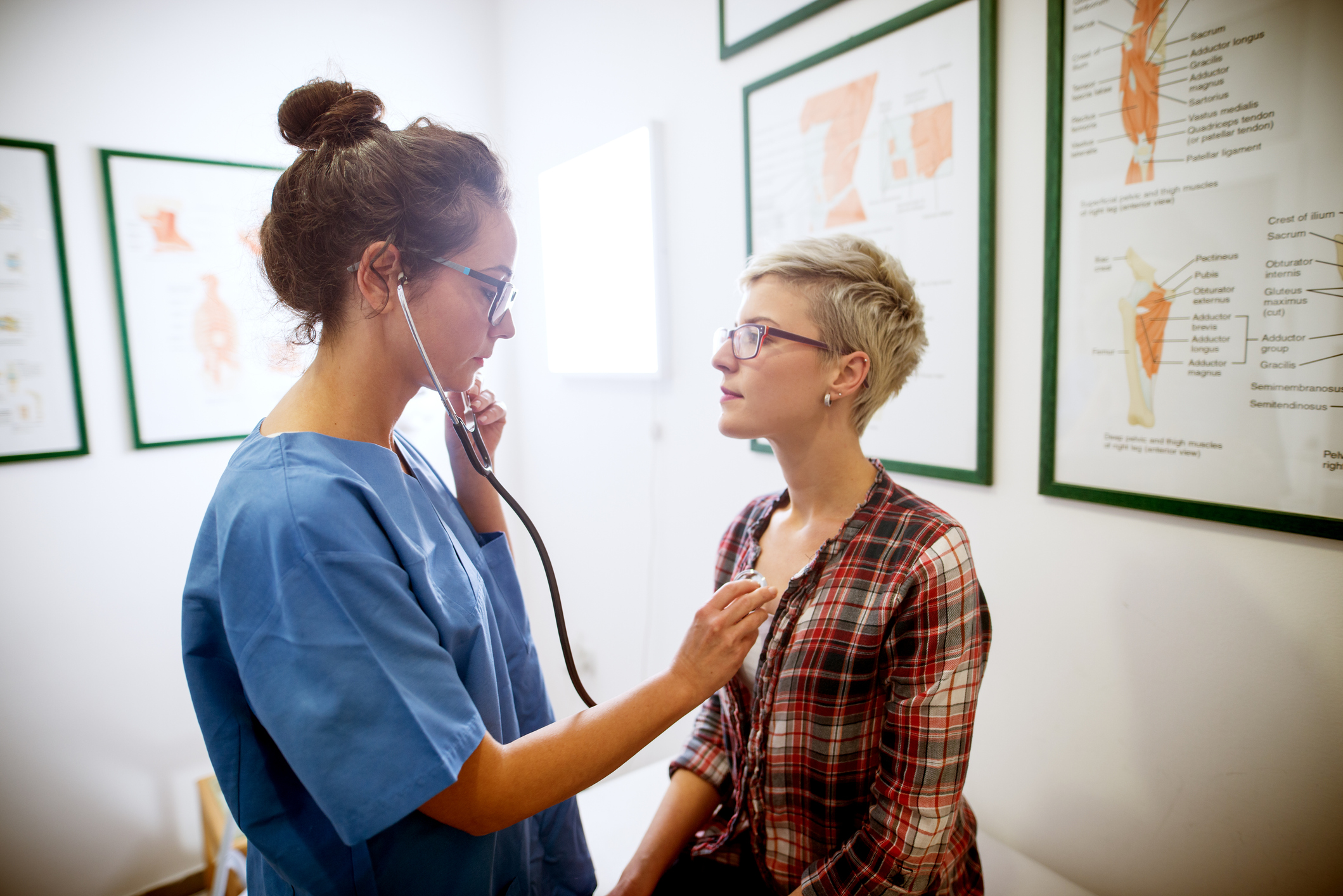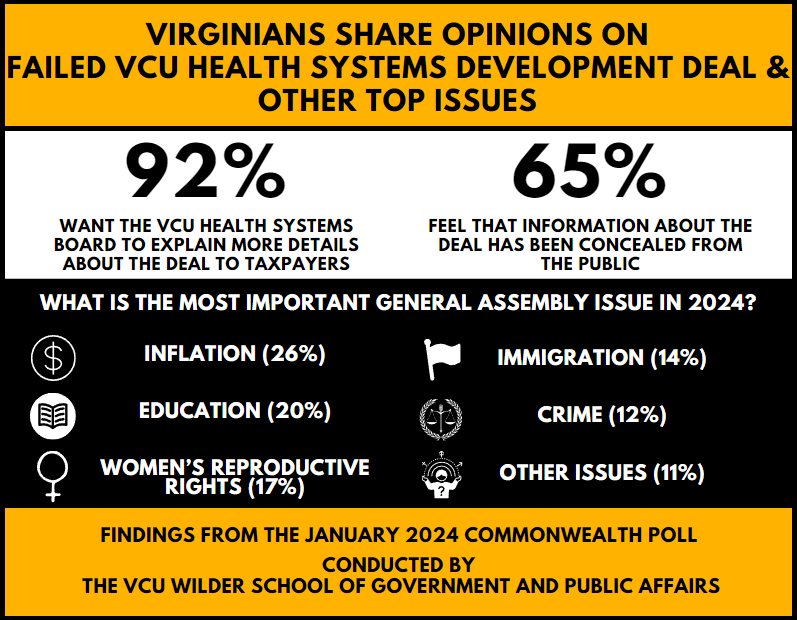News
Wilder School Commonwealth Poll: Over half of Virginians would vote to give every individual the right to make and carry out one’s own reproductive decisions

A majority of Virginians also support increasing penalties for drug dealers, legalizing marijuana and prohibiting parents from having ability to ban a book from a school’s library.
RICHMOND, Va. (Jan. 30, 2024) - Almost 6 in 10 Virginians would vote yes in a referendum regarding abortion rights in the commonwealth, according to the January 2024 Wilder School Commonwealth Poll.
Additionally, Virginians expressed strong support (83%) for increasing penalties for drug dealers, and support (55%) for legalizing the retail sale of marijuana. With regard to public schools, only 32% agreed with parents having the ability to ban a book in a public school library, with nearly 7 in 10 disagreeing.
“Clearly, Virginians favor abortion rights, to the tune of 60%,” said L. Douglas Wilder, the 66th governor of Virginia. He continued, “Education is still a high-priority concern for the people, yet 50% said that the cost of a college degree was not worth it. Additionally, 71% of those polled felt Virginia should be required to cut costs, and 63% said that community colleges should be free for all students.”
Wilder continued, “Only 34% felt that transgender students should use bathrooms corresponding with a different gender than their sex. There is strong support for increasing penalties for drug dealers (83%) and just over half (55%) for legalization of marijuana sales. Poll results show that 65 % of those polled feel what books are available in our school libraries should not be determined by parents.”
Reproductive rights
On Election Day in Ohio this past November, voters approved a state constitutional amendment giving every individual the right to make and carry out one’s own reproductive decisions. This included, but was not limited to, decisions on contraception, fertility treatment, continuing one’s own pregnancy, miscarriage care and abortion. The ballot measure did not allow the state to restrict abortion after fetal viability, except when “necessary to protect the pregnant patient’s life or health.”
Commonwealth Poll participants were asked whether they would vote for or against a similar measure in Virginia if one were introduced. The majority (57%) of Virginians said they would vote yes in such a referendum, and 24% said they would vote no, with a few sizable differences across demographics. Virginians age 25 to 34 were less likely to vote yes (45%) compared with 73% of both 18- to 24-year-olds and 35- to 44-year-olds.
Increased drug-dealing penalties
Opioid deaths have recently increased in Virginia, and according to the Virginia Department of Health, an average of seven Virginians died of a drug overdose every day in 2021. Between 2020 and 2021, the number of overdose deaths increased by 29%. There has been legislation to increase penalties for dealers found responsible for dealing a drug that caused a death overdose. When asked whether they agree or disagree with increasing penalties for drug dealers found guilty of dealing opioids that lead to an overdose death, just over 8 in 10 Virginians (83%) agree with the legislation, while 12% disagree. Opinions did not vary much across key demographics, though Virginia Republicans leaned somewhat more favorably to the legislation than Democrats (90% versus 77%).
“Education is still a high-priority concern for the people, yet 50% said that the cost of a college degree was not worth it. Additionally, 71% of those polled felt Virginia should be required to cut costs, and 63% said that community colleges should be free for all students.”
– Governor L. Douglas Wilder
Public school concerns
Participants were asked three questions regarding various public school concerns in Virginia. When they were asked whether transgender students should be allowed to use bathrooms corresponding with a different gender than their birth sex, only 3 in 10 Virginians agreed (34%). The issue is quite polarized across several demographics. Younger Virginians were more likely to agree than those who are older—72% of 18- to 24-year-olds agreed with the statement, whereas among those 25 or older, only 32% agreed. By political affiliation, Democrats were significantly more likely to agree than Republicans (63% versus 10%).
Similarly, when asked whether transgender students should be allowed to participate with a sports team corresponding with a different gender than their birth sex, 26% of Virginians agreed, while 65% disagreed. As with the prior question, Democrats were generally more favorable to the premise than Republicans — around half of Virginia Democrats (47%) agreed, compared with just 6% of Republicans and 22% of Independents. Again, Virginians ages 18 to 24 were more likely to agree than Virginians 25 and older (65% versus 22%).
Participants were also asked whether parents should be allowed to object to the presence of any book in a public school’s library and have that book removed. Nearly 7 in 10 Virginians disagreed (66%), with 32% agreeing. Responses were split primarily by political party, with only 11% of Democrats agreeing that parents should be able to object to a book’s presence compared with 55% of Republicans and 23% of Independents.
Marijuana policy
Currently in Virginia, the possession of certain amounts of recreational marijuana is legal, but the sale of it is not. Just over half of Virginians (55%) agreed that Virginia lawmakers should legalize the retail sale of marijuana in Virginia, while 38% disagreed. Opinions varied significantly by political affiliation — 76% of Democrats favored legalization of marijuana sales, compared with 39% of Republicans and 46% of Independents. Individuals with annual household incomes of $35k to $100k were also less likely to agree (44%) compared with those earning either less than $35k (71%) or $100k or more (64%). Generally, younger participants were more likely to agree, with 71% of 18- to 44-year-olds and 46% of those 55 years or older agreeing.
If a participant strongly agreed, somewhat agreed or somewhat disagreed with the legalization of retail marijuana sale, they were asked a follow-up question on whether they agreed or disagreed that, if Virginia lawmakers regulate the sale of marijuana in Virginia, the taxable income should be used to help fund Virginia’s social services. Of those asked, 82% of Virginians agreed, and 16% disagreed. Although all political affiliations had a majority in favor, Virginia Democrats were somewhat more likely to agree, with 92% agreeing compared with 71% of Republicans and 60% of Independents.
College costs
Virginians’ perspectives on college costs are complex. Fewer respondents agree that the cost of a four-year college education is worth it, but most respondents favor making community college education free. Currently, the average total cost at a four-year institution in Virginia is $26,484 per year. When asked whether the current cost of a four-year degree at an in-state college or university in Virginia is worth it, 50% of respondents said that the current cost of a four-year degree was not worth it, while 38% said the current cost was worth it. In the Summer 2023 Commonwealth Poll, 47% of respondents agreed that the cost of college was worth it, so even fewer (38%) agree now. Increasingly, for more Virginians, the cost of college is not worth it.
Agreement generally increased with the income and age of the participant. Individuals with a family income of less than $20k were less likely to agree (21%) than those with family incomes of $150k or more (55%). The same pattern emerges with age, as only 15% of those 18 to 24 years old agreed, compared with 51% of those 65 years or older.
Participants were also asked which method would help make college costs more affordable among four options: (1) the commonwealth of Virginia should invest more money from the budget into higher education, (2) the commonwealth of Virginia should freeze tuition for an extended amount of time to keep costs down for students, (3) higher education institutions in Virginia should be required to cut costs to a certain percent to keep costs down for students, and (4) the commonwealth of Virginia should make community college free for all students to keep costs down. The most popular option for Virginians was for higher education institutions in Virginia to be required to cut costs to a certain percent to keep costs down for students, with 71% choosing this option. The second-most favored option was offering free community college for all students, with 63% agreeing that this would be helpful.
About the VCU L. Douglas Wilder School of Government and Public Affairs
Ranked No. 39 among 275 graduate schools of public affairs by U.S. News & World Report and No. 16 in Social Policy, No. 17 in Urban Policy, No. 19 in Public Management & Leadership, and No. 36 in Public Policy Analysis, the L. Douglas Wilder School of Government and Public Affairs at Virginia Commonwealth University advances excellence in governance and promotes evidence-based public policy in Virginia and beyond. The school offers an array of graduate, post-baccalaureate and doctoral programs in virtually every policy area, including criminal justice, homeland security and emergency preparedness, public administration, public policy and administration, and urban and regional studies and planning. Additionally, the Wilder School is home to a robust Centers and Institutes for Public Policy that provides applied research in the areas of state and local government, social equity and leadership, and a range of services to clients in state and local government, nonprofit organizations, businesses and the general public. Learn more at wilder.vcu.edu.
CONTACTS:
L. Douglas Wilder
Distinguished Professor
Phone: (804) 827-0776
Email: ldwilder@vcu.edu
Robyn McDougle
Associate Dean of Research and Outreach
Phone: (804) 721-6703
Email: rdmcdougle@vcu.edu
